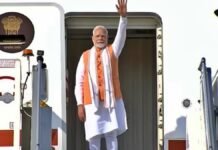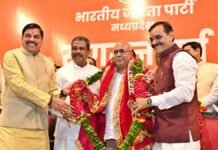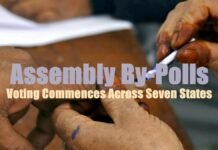
Key Points
- Governor Sparks Controversy: Tamil Nadu Governor RN Ravi faced backlash after asking students at a Madurai engineering college to chant “Jai Shri Ram,” drawing criticism from the DMK and Congress for promoting religious ideology.
- DMK Accusations: The ruling DMK accused Ravi of acting as an RSS ideologue and violating India’s secular principles by introducing religious slogans at a public event.
- Supreme Court Setback: Just days earlier, the Supreme Court ruled against Ravi’s decision to withhold assent on 10 Tamil Nadu Assembly bills, declaring his actions “illegal” and “arbitrary.”
- Federalism Debate Intensifies: The controversy highlights ongoing tensions between the Tamil Nadu government and the Governor over constitutional roles and federal principles.
Madurai: Tamil Nadu Governor RN Ravi has once again found himself at the center of a political storm after asking students to chant “Jai Shri Ram” during an event at Thiagarajar Engineering College in Madurai. The incident, which occurred on Saturday, has drawn sharp criticism from the ruling DMK government and opposition parties, who accuse the Governor of promoting religious ideology in violation of India’s secular constitution.
The Controversial Event
While addressing students as the chief guest, Governor Ravi concluded his speech by urging them to chant “Jai Shri Ram.” A video of the event shows him saying, “Let us pay tribute to Lord Shri Ram. I say, and you say — Jai Shri Ram,” prompting students to repeat the slogan. The video quickly went viral on social media, sparking widespread debate.
The DMK and Congress were quick to condemn the act. DMK spokesperson Salem Dharanidharan stated, “It’s baffling that the Governor would visit an engineering college and make students chant words of a particular religion. India being a secular country, it goes against our Constitution to impose such religious colors at a college event.”
Congress MLA JMH Hassan Maulaana echoed similar sentiments, accusing Ravi of acting like a “propaganda master” for the RSS and BJP. “The Governor is occupying one of the highest posts in this country but is behaving like a religious leader,” he said.
Supreme Court Ruling Against Governor Ravi
This controversy comes just days after a significant Supreme Court judgment on April 8, 2025, which dealt a major blow to Governor Ravi. The court ruled that his decision to withhold assent on 10 key bills passed by the Tamil Nadu Assembly since 2020 was both “illegal” and “arbitrary.”
Key Highlights of the Verdict:
- Bills Deemed as Laws: The court declared that all 10 bills are deemed to have become law from November 18, 2023—the date they were re-submitted to the Governor by the Assembly.
- Governor’s Actions Nullified: The bench of Justices JB Pardiwala and R Mahadevan stated that Ravi’s actions lacked “bona fides” and violated constitutional norms under Article 200.
- Timelines for Assent: The court established strict timelines for governors and presidents to act on state bills—one month for governors and three months for presidents.
The judgment was seen as a major victory for Chief Minister MK Stalin’s government, which had accused Ravi of stalling legislation to obstruct governance.
DMK’s Long-Standing Feud with Governor Ravi
The latest controversy adds fuel to an already strained relationship between Governor RN Ravi and the DMK-led Tamil Nadu government. Over the past year, Ravi has been accused of:
- Withholding assent on key bills aimed at reducing gubernatorial powers in state universities.
- Acting against federal principles by delaying legislative processes.
- Promoting ideological agendas inconsistent with Tamil Nadu’s Dravidian cultural ethos.
DMK leaders have repeatedly called for Ravi’s removal, arguing that his actions undermine state autonomy and democratic governance.
Political Reactions
- DMK Criticism: The ruling party accused Ravi of behaving like an RSS ideologue. Party spokesperson Dharanidharan said, “The Governor has repeatedly tried to destroy Tamil Nadu’s history and culture.”
- Congress Condemnation: Congress MLA Maulaana stated that Ravi’s actions were inappropriate for someone holding a constitutional post.
- CPI Demand: The Communist Party of India (CPI) called for Ravi’s immediate recall, citing repeated constitutional violations.
Implications for Federalism
The ongoing tensions between Tamil Nadu’s government and its Governor reflect broader challenges in India’s federal structure. The Supreme Court’s recent judgment emphasized that governors must act within constitutional limits and respect legislative mandates. Analysts believe this case could set a precedent for resolving similar disputes in other states.
Governor RN Ravi’s call for students to chant “Jai Shri Ram” has reignited debates about secularism and federalism in India. Coupled with his recent Supreme Court setback, this incident underscores growing friction between state governments and governors appointed by the central government. As political tensions escalate, questions about the role of governors in India’s democracy remain more relevant than ever.




















































